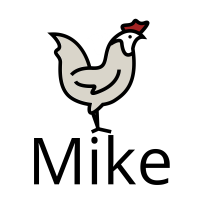I’ve been working with a Javascript (+ TypeScript) + Java + SQL stack for the last 10 years.
For 2024 I’d like to learn a new programming language, just for fun. I don’t have any particular goals in mind, I just want to learn something new. If I can use it later professionally that’d be cool, but if not that’s okay too.
Requirements:
- Runs on linux
- Not interested in languages created by Google or Apple
- No “joke languages”, please
Thank you very much!
EDIT: I ended up ordering the paperback version of the Rust book. Maybe one day I’ll contribute to the Lemmy code base or something :P Thank you all for the replies!!!
Personally, the language that’s taught me the most to learn has been Haskell. It has a lot of very interesting ideas and a learning curve that plateaus after most other languages. There are several ideas that have trickled down from Haskell to other parts of the programming world and learning about them in the context Haskell is in my opinion better because you’ll learn about them in a context where they fit in with the rest of the language very well instead of being late additions that offer an alternate way of doing things.
Coming from Java and JS, Haskell has a very different approach to a lot of things so you’ll have to re-learn a lot before you get productive in it. This can be frustrating for some but you’ll learn more if you get over that hump on the other hand.
Haskell doesn’t see very much industry use and arguably isn’t very well suited for industrial application (I haven’t used it professionally so I don’t know personally) so it might not directly help you land any new jobs but it is in my opinion it’s a very good way to develop as a programmer.
C# is a great choice.
Incredibly versatile language and should be an easy jump from java.
My two cents: I strongly agree with this. We just deployed an intranet blazor server app running on Linux (don’t know which distro) and apache (we might switch to nginx soon). It works very well and we had to write less than 100 lines of JS (mostly for file download and upload) One of my workmates was hired one year ago and at the time he didn’t know anything about .Net stack. Now he is mostly autonomous and he loves .Net and blazor in particular. Obviously YMMV.
Bundle size is my only complaint with blazor, has to send the .net runtime in webassembly to the client.
Aside from this, C# on the browser is an absolute joy to use. I’d use for everything if I could.
You are talking about Blazor webassembly, I am talking about Blazor server side, which loads as fast as a “normal” website.
Server side Blazor has other caveats, that’s why I specified it is an intranet project, where server side Blazor fits very well. Anyway, at the moment, Microsoft is still putting effort in polishing both type of Blazor hosting model.
This is not our first Blazor intranet web app and some of them are running in production for one year more or less.
It is really a joy to program using Blazor, especially if you need cross tab/browsers/device/user real time communication, which comes almost free thanks to underlying SignalR channel.
Ah you mean Razor then. Blazor lets you run C# in the browser, but Razor is the one that needs a server and streams changes to the client using signalR.
I know Microsoft didn’t get this right with naming and you got caught in the trap but there are 2 (actually 3) ways of hosting Blazor.
I also see that this confusion won’t help OP choose Blazor over some more coherent dev environment hehehehe
I advise you to learn something different and hard for you. Only this case will help you to grow and realize a lot of new.
- Rust for hard
- Nim for something different
- C for understanding how things work
All these languages are efficient and forget about hype and popularity. Language does not matter if you have what to write with it.
Id suggest rust, gets you a step closer to the hardware and a bit of a different paradigm than Java while still feeling high level.
Rust is definitely something I’ve been keeping an eye on. The syntax looks a bit scary, to be honest, but looks very versatile.
I’m a Rust noob. At first it’s daunting and nothing will compile. But it’s getting easier and I feel like getting over that initial difficulty is mainly a matter of internalizing a few basic rules, after which it feels more natural. So from what I’ve seen so far, I wouldn’t rate Rust as especially difficult. It certainly feels easier than C++.
For a really challenging language I’d suggest Haskell. That one nearly broke my brain because thinking functionally is really very different if you’re used to more procedural languages. Rust, it seems, teaches you new discipline, but Haskell teaches you a different way of thinking.
Anyway, that’s how it feels as a relative noob in both.
I can recommend Rust - I’m training a few people on it.
And a pure functional programming language like Haskell or Scheme, if you don’t know what functional programming is, or are not comfortable with it. Functional programming needs a different mental approach to traditional (imperative) programming paradigm. Some of the more modern languages like Rust, JS and Python incorporate a lot of functional programming constructs. So it makes sense to learn them.
And a lisp - Common Lisp’s popularity is a public secret. Scheme is also fine. This family is homoiconic (program and data are treated more less the same). The syntax is actually very close to its AST. This gives Lisp unparalleled metaprogramming capabilities - mostly through macros. Macros in traditional languages are nowhere near Lisp Macros.
If it interests you, study a stack based language like Forth or Factor. Though they feel very different from Lisps, they have similar underlying properties. And you get more or less the same advantages.
+1 for Rust, the learning curve can be pretty daunting, but once you’re over the hump you’ll never want to go back
Learnyouahaskell.com is a good way to get started with Haskell. I’d recommend that as best for your mind expansion mission.
DotNet is closest to Java, but hang on to your hat: the state of C# is at least half a decade ahead of Java, if not a full decade. It’s sophistication will make Java use feel like banging rocks together. DotNet Core can now run on all three primary platforms, and with some careful work, you can write a single program that can compile down to each platform and carry along its own required binaries, no pre-install of any framework needed.
My second recommendation would be Rust. Stupidly steep learning curve, but an absolutely game-changing one where safety and security is concerned. It’s my next objective, personally speaking.
Any other language I could recommend starts getting into speciality purposes, which makes general use more difficult or even wholly inappropriate.
For example, if you are dropping into DotNet for business applications, I would also recommend diving into F# for that functional goodness for building complex business rules and data handling. But building an entire app in F# can be jamming a round peg into a square hole under many circumstances, it’s appropriateness envelope does not cover as many cases as C# does. You want to use C# for boilerplate/frameworks, F# for the core bits where it is going to shine.
Ada particularly the SPARK subset. It’s approach is quite different than most languages, focusing on minimising errors and correctness. It’s fairly difficult but I like to use it to teach people to actually understand the problem and how to solve it before they ever write the code.
Python seems to be a staple for as long as I can remember and it looks like it’s still gonna be going strong for a good while yet!
I’m thinking of taking the dive and finally learning it myself soon.
Python is especially great for quick scripts or PoCs. I’ve been using it a lot lately to prototype some things and it just makes it a breeze
Main complaint is the snake_casing convention. By far my least favorite
Hah I love snake case.
I also love python for distributed micro tasks and data pipelining
I am the only person that feels like snake casing belongs in declarative stuff, data serialization etc. (SQL, protobuf, JSON, YAML…) while camel case elsewhere?
I don’t hold any of that, I just find it the most readable for me.
Packaging solutions kinda sucks, but we’re about to get a JIT in the main CPython so that’s exciting.
When I used to work a lot with Python the packaging solutions available were the bane of my existence. I hope they’ve gotten better by now…
Python’s become very widely used in industry - it’s definitely a plus when looking for jobs these days. TIOBE now says it’s the most popular language in the world.
When I first ventured into programming, I felt like a complete novice. With no prior experience, diving into the complex world of coding seemed daunting. That’s when I stumbled upon full stack development service. These services offered a comprehensive solution, covering everything from front end to back end development. It was like having a guiding hand through the intricacies of programming. With their expertise, I was able to navigate the complexities of software development with confidence. Full stack development services became my stepping stone into the world of programming, helping me transform from a novice into a proficient developer.
I recently picked up Rust, still a beginner, but it’s very nice. And the compiler errors and tips are top. Since I used only Python before, Rust is my first compiled language and I’m glad it was Rust. Options and Result’s are also something I appreciate tbh. Other than for AI, simple stuff and maybe prototypes, I would use Rust over Python. Definitely recommend it. The borrow checker is a pain in the ass though. I’ll also be using it later for embedded systems when I become more fluent with it. I am also currently making a big project with Rust that I haven’t been able to do with Python.
Download GODOT and learn the scripting language and the shader language. Make a game! Or at least neat shader art.
Bonus answer: Csound. Make funky noises with code.
I love C#, but F# is also super fun and worth checking out.
I’ll suggest Elixir. It’s a language that runs on the same virtual machine as Erlang, which has proven to be great for ultra-reliable and excellent at managing many, MANY concurrent processes.
Elixir itself builds upon this great foundation with a syntax similar to Ruby, but entirely functional. It’s a delightful language to read and write.
C or C++, specifically with the use of compiler explorer so you can get a feel for how code actually runs.
Common Lisp or Haskell to get a taste of something really different.







